I've been getting to know the Grasshopper for two weeks now. I'm feeling it's about time I share some early impressions. It's been a busy two weeks, so my experience thus far is limited to a smallish number of uses made up of my more common use-cases, as I'll describe below.
I'll start with a list of the vapes that I've used and enjoyed, both for context as well as because the list is small enough:
MFLB. Thermovape Cera, loose leaf cartridge. Solo. Hammer.
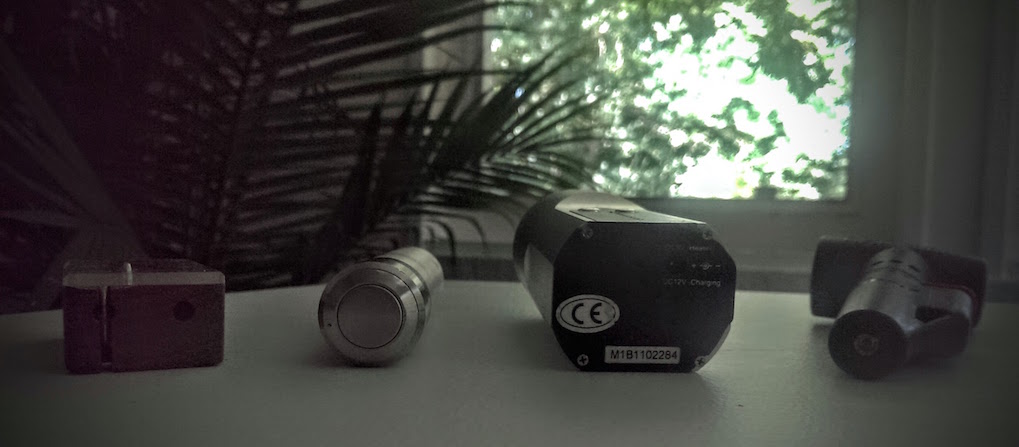
I've also had experience with V2's Pro Series 3 loose leaf cartridge, but am not a fan.
Holding the Grasshopper in my hands, I'm reminded of when I first got a Cera. After anticipating something through photos for months, having it in your hands feels like holding a baby unicorn.
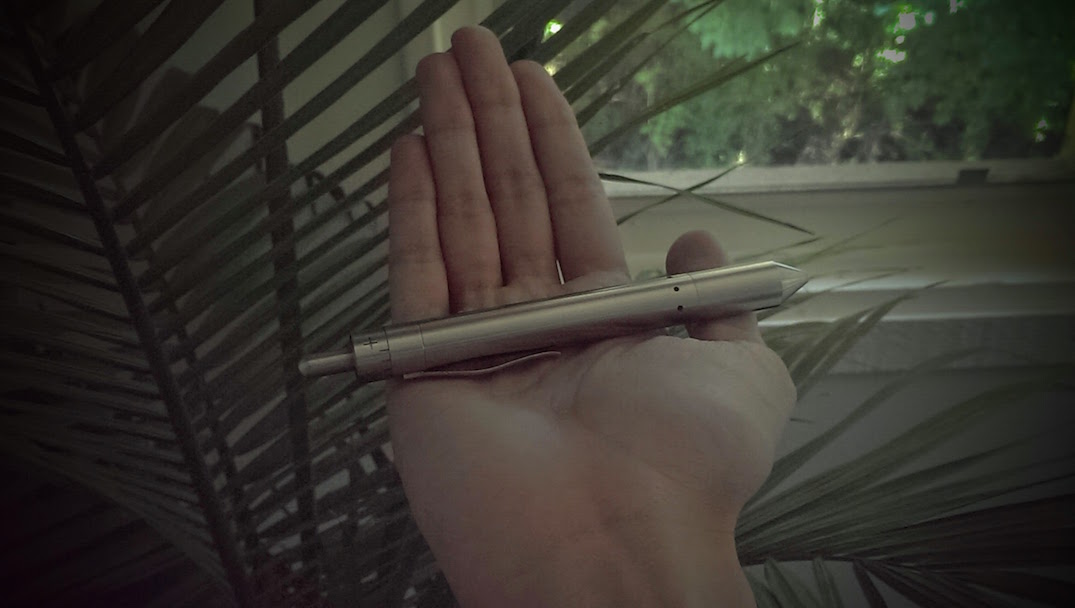
The aesthetics are without a doubt a strong draw.
The size is right, and the details like the clip, the dial, the button, and the taper of the mouthpiece look and feel great. The action on the temperature dial is a bit tight. It feels a tad heavy in the hand for its size, due in no small part to the battery inside. Still lighter than a Cera, of course…
My only aesthetic complaint with the design is that the LED (singular) is very bright and clearly located on one side of the unit, so that the light shines with differing intensity depending on the viewing angle. If you catch the LED dead on, it is damn bright. Using it in a small dark room leads to a light show of circles. You can't completely cover up the light, because it comes from the same place that the air enters.
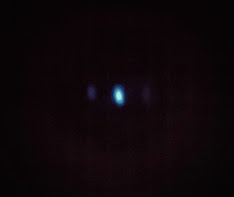

Enough about the looks. How about vaporizing?
The Grasshopper in particular has been an interesting vape to follow and then attempt wrap my head around, due to how dramatic its announcement and selling points are and were in 2013. Back then, a "pen vape for herbs" was purely the realm of fantasy. Any new users seeking such a vape were strongly warned away from attempts at the concept from Atmos, and instead advised to reconsider what they were looking for in a vape, and why.
The closest contenders in the form factor were TET's T1, Evolution cartridge, and Cera loose leaf cartridge, and the Bender from the makers of the Persei. All of these are cylindrical and portable, but much too large to be considered pens. The Evolution cartridge was an exception when paired with a smaller power supply, but it required some serious practice to wield well, and forget about battery life.
Two years later, many advances have been made in the vaporizer marketplace. Flowermate, Imag, Firefly, Elevape SV, Summit, Arizer Air, Crafty, Mighty, Pax 2, Zion… Yet the Grasshopper still stands out for its makers' bold claims about its battery life, heat up time, vapor-producing capability, custom battery, use of purely convection heating, 3d-printed heater, and high tech insulation, all of course in the attractive pen-shaped form factor.
Folks with physics on the mind were quick to point out just how impossible all of these claims seemed when put together:
However, in my opinion the technology of the Grasshopper is something to behold, unique in the current marketplace, and deserving of a place in vaporizer history.
The power is there.
Case-in-point: vaping ABV.
Now, an aside… In areas where even medical access to bud is a legend, consistent supply is quite a luxury. In such a situation, the substantial benefit of re-vaping ABV, and even purposefully under-vaping your flowers and then stashing them, shouldn't be dismissed. No, it doesn't line up with the ideal of the cannabis connoisseur that only vapes until the terpenes are gone. But not only does vaping ABV immensely extend one's stash, it also provides a new dimension of control for those with little choice in their strains. By varying temperature and not being afraid to reuse vaped herb, you can "under vape" in the day time and then save that bud to be re-vaped in the evenings, or any time you're looking for heavier cannabinoids, for example.
Anyways, all that is to say that I'm very experienced with re-vaping ABV and taking things as dark as I can, so as to provide context when I say: my time spent loading ABV into the Grasshopper has left me impressed with the heat on-tap.
Among my vapes, the MFLB reigns king here. I'd put the Hammer close behind, but I haven't been able to wield its power with quite enough precision to make ultra-high-temperature vaping of ABV a comfortable activity rather than a worrisome dance with the risk of combustion. With the MFLB on the other hand, I can wield heat with comparatively surgical precision.
The Grasshopper differs from those other two in that it features regulated power, like the Solo. It succeeds impressively here, in that I have yet to combust in it (as one would hope with a power-regulated vaporizer) and yet I'm happy with its performance at the top-end of my heating needs (which can be difficult to reach for a power-regulated vape without risking combustion that can't be blamed solely on the user as with fully manual vapes). The Solo is no slouch here either, but really taking it all out of the ABV in that vape requires full loads over a domed screen with time allowed for heat-soaking, in my experience, due to the particulars of that vape's heating mechanism and glass bowl.
The next concern of importance in my opinion, especially for a convection vape, is how evenly the load is heated.
For example, the T1 is known to suffer from "channeling" of the hot air through the herb, which unevenly heats the flowers in the bowl leading to concentrated dark spots in the midst of lighter colored ABV. Stirring is then the only solution from the end user's perspective, and I'd hoped that the Grasshopper wouldn't require any stirring à la Cera.
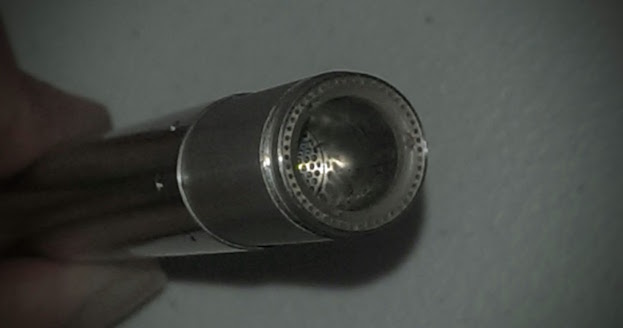
A large variable here is bowl size, and the Grasshopper's, to me, is large. I haven't gotten to play with all the potential variables here (load size, starting temperature, draw speed, grind consistency, tamping vs no tamping, RH, length of draw-cycle), but I can say that with a small load (~.1-.2 grams) of dry, never-vaped flowers, vaped at the lowest temperature, for two or three draw-cycles, the load looks impressively evenly vaped without any stirring. This represents another average use-case for me, so I'm pleased with the result.
Now, "draw-cycle" is a term I came up with to describe a unit of usage that is unique to the Grasshopper's capabilities and method. Something I should have mentioned by now is that the heater really does heat up quickly. Really, really fast! Seeing for the first time the light switching from heating (solid red) to ready (solid blue) so quickly, with vapor actually being produced in short order, really blew my mind.
It is quick. This is plainly a great feature to have in a portable, as any fan of the MFLB or other similar portables (Palm, FlashVAPE S1) will tell you. Those vapes are instant-action manually-controlled conduction devices. The Grasshopper's feature set instead first brings to mind the Solo (for its variable power regulation) and the loose leaf Cera (convection), both of which involve the user waiting while things come up to temperature. But the Grasshopper's heater is so fast, with a heat-up time of mere seconds, that it fits into the company of those instant-action conduction vapes in my opinion.
This fast heat-up time conversely allows you to shut it off at will and not worry about bringing it back up to speed. This is in contrast to the Solo, where you'd generally want to leave it humming if you want to take another hit in the next minute or two rather than think about shutting it off in the mean time to save battery. So I use the term draw-cycle to describe turning it on, taking a hit, and then actively shutting it off immediately afterward. I usually shut it off before the end of my draw and then cool down the heater with the end of the draw.
I'll also note that "shut it off at will" is something of a requirement, as a latching switch is involved here rather than a momentary one as is the case with those instant-action conduction vapes. I wish the Grasshopper's switch was around back in the Cera days. A high-amperage latching switch was all that some of us dreamed of! In contrast, when using the Grasshopper with short draw-cycles I wouldn't mind if the switch were momentary instead!
In contrast, when using the Grasshopper with short draw-cycles I wouldn't mind if the switch were momentary instead!
Make no mistake, the Grasshopper's switch is substantial. Pressing it requires more force than any ink pen I've ever used. It's not so much that it's a struggle if you're clicking it on with your thumb, as is usual for an ink pen. But, I do struggle a bit to turn it off with my index finger when I've got the business end pointed toward me. It definitely is not silent and not going to happen by accident. It's not as loud as the click of a Hammer's ignition, but it's enough that someone nearby would surely notice.
Now, I said that shutting it off at will was "something" of a requirement, because the Grasshopper does have an "auto-shutoff" function that shuts off the heater if it hasn't been drawn from in the last 18 seconds (I believe; I haven't played with timing this myself yet).
Technically, this is a sleep or auto-idle function. The LED blinks red very slowly when it is in this sleep state. To wake it back up, you have to press the switch twice (off, then back on). Unfortunately the battery usage in the idle state does not seem negligible. I haven't done extensive testing here, but I did once turn it on right off of the charger with a full battery and set it down without ever drawing on it. I left it to auto-idle, and when I came back many hours later the battery didn't have enough juice left to get it back up to temp.
It should also be noted that the "draw sensor", which I imagine is really just a check for the heater reengaging to restore lost heat, requires a fairly strong draw. Now, what constitutes a strong draw is a subjective thing. Personally, I'm used to vapes where a lighter draw is the modus operandi, and I've found that my instinctive light draw is not enough for the Grasshopper to notice. If I want to take a longer light draw, that is, longer than the built in auto-idle timer as is my usual, I have to add in a momentary sip of quick inhalation to let the Grasshopper know I'm there, at which point I can revert to my light draw for a bit longer.
I'm sure there are those who will be happy pulling "hard" (subjectively) all the time. The Grasshopper can actually handle it. Use-cases are highly varied…
Now, a harder draw will lead you to notice one (here problematic) element of what I'll call the "heat control puzzle" of portable convection vaporizers. That puzzle consists of balancing heat on tap, heat delivered to the load, heat spreading to the user's hands through the vaporizer body, heat spreading to the mouthpiece and the user's lips, and finally the heat of the vapor itself as it exits the mouthpiece.
It's that last one that I'm talking about. Even at the lowest temperature, if you take a moderate to strong draw from the Grasshopper while holding the tip of your tongue just in front of the mouthpiece, you will feel that the vapor is very hot. This is what I would expect from a convection vape with such a short and direct vapor path. As a fan of the ceramic UFO top-cap/mouthpiece from the Cera, I'd love to see some UFO-style vapor path redirection in the mouthpiece here.
I've now covered most of that heat puzzle: the Grasshopper's heat on tap, one case of successfully even vapor delivery, and the heat of the vapor as it exits the mouthpiece. This leaves the heat of the body and the heat of the mouthpiece to discuss.
First, whatever insulation scheme they're using in the body around the area with the heater is impressive. Heat conducting to the body from the heater is simply not a problem when it comes to the sort of usage I've put it through.
It's the heat of the mouthpiece that gets to be a problem. You can tell that some careful engineering went into reducing this issue: for example, the mouthpiece is actually a long piece of metal that "sheaths" around the bowl and heater area, creating an extra layer to the front end of the body. Also, the tip of the mouthpiece is actually made up of concentric cones. It appears to me that most of the heat that ends up becoming bothersome is brought to the mouthpiece the same way that it got to the flowers: via convection.
For this reason, just how quickly and to what severity heat becomes an issue is dependent on temperature setting and style of usage. But as an educated guess, for anything beyond shortish hits (shortish from my large lung-ed perspective) spaced minutes apart, you're likely going to want to have the silicone heat guard on hand.
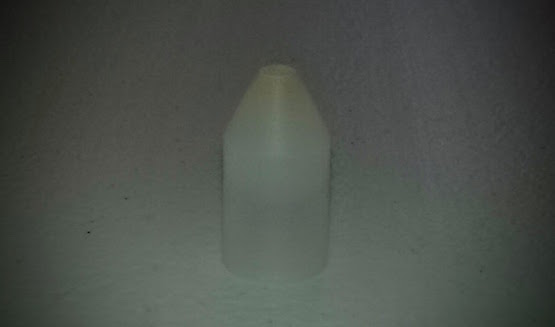
The heat guard is actually very nicely executed, providing a thick and solid mouthpiece section near the front that extends away from the end of the Grasshopper's mouthpiece. This is in contrast to Cera's silicone heat guard which was merely a domed cap of uniform thickness that left the tip of the mouthpiece exposed (albeit the last place on the Cera to get hot thanks to the "floating" aspect of that mouthpiece's design).
It seems to me that the guard allows you to at least double your time vaping comfortably. Eventually the heat will make its way into the silicone, and you'll have to wait or switch to a water tool if you happen to have one on hand.
Time… That brings us to the battery.
For sure the chemistry is impressive in combination with their heater tech, kicking out power as quickly as advertised, and it's so small! Some specs for the geeks: my measurements put the battery at 10mm diameter and 60mm length, making this a 3.7v 10600 battery rated at 750 mah. Unfortunately, present reality makes itself known here and the battery life is, IMO, objectively short. It's not bad at all considering the design and technology involved, but it is not a battery that makes you say "wow, this thing lasts forever" while you're using it.
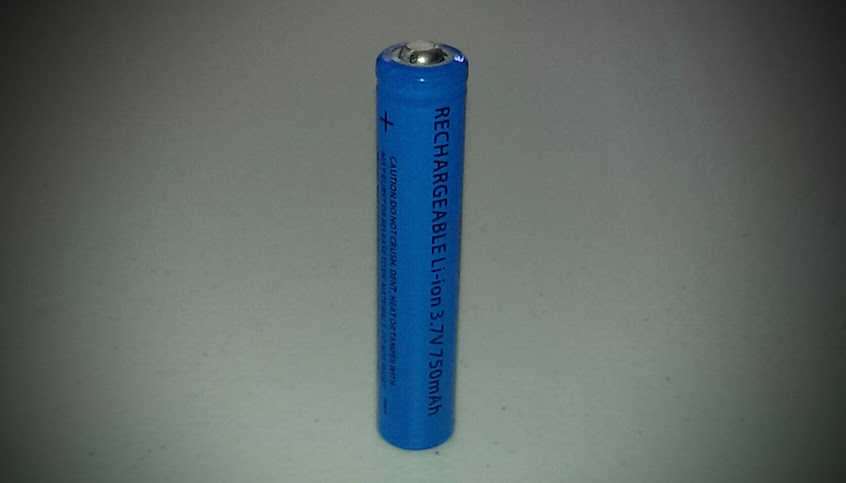
Like everything else, that run time and how it affects you are both heavily dependent on how you use the vape. In my limited experience, max temperature noticeably reduces run time, minimum temperature noticeably increases it, and actively shutting off the vaporizer at the conclusion of your draw rather than letting it time out also noticeably improves run time.
If you plan on using the Grasshopper in the heaviest scenario I can imagine: in a group with a water tool where mouthpiece heat is no issue and the vape will constantly either be drawn from or left idling, chain hitting with abandon, I'm betting you're going to want two extra batteries at a minimum. If you put the first battery on the charger as soon as it's been exhausted, I'd bet it would be charged and ready to go by the time the third has been exhausted. That's a benefit of having batteries that only hold 750mah, they charge pretty quickly.
While I haven't put it through the group-around-a-water-tool gauntlet, I do have an Orbiter. Though I've only used it with the Grasshopper twice for short periods of time, I can say it it's a nice combo. The silicone mouthguard makes a good connection with the 14mm GonG joint.
That wraps it up for my early impressions. Thanks for reading!
…
I'll start with a list of the vapes that I've used and enjoyed, both for context as well as because the list is small enough:
MFLB. Thermovape Cera, loose leaf cartridge. Solo. Hammer.

I've also had experience with V2's Pro Series 3 loose leaf cartridge, but am not a fan.
Holding the Grasshopper in my hands, I'm reminded of when I first got a Cera. After anticipating something through photos for months, having it in your hands feels like holding a baby unicorn.

…
The aesthetics are without a doubt a strong draw.
The size is right, and the details like the clip, the dial, the button, and the taper of the mouthpiece look and feel great. The action on the temperature dial is a bit tight. It feels a tad heavy in the hand for its size, due in no small part to the battery inside. Still lighter than a Cera, of course…
My only aesthetic complaint with the design is that the LED (singular) is very bright and clearly located on one side of the unit, so that the light shines with differing intensity depending on the viewing angle. If you catch the LED dead on, it is damn bright. Using it in a small dark room leads to a light show of circles. You can't completely cover up the light, because it comes from the same place that the air enters.


…
Enough about the looks. How about vaporizing?
The Grasshopper in particular has been an interesting vape to follow and then attempt wrap my head around, due to how dramatic its announcement and selling points are and were in 2013. Back then, a "pen vape for herbs" was purely the realm of fantasy. Any new users seeking such a vape were strongly warned away from attempts at the concept from Atmos, and instead advised to reconsider what they were looking for in a vape, and why.
The closest contenders in the form factor were TET's T1, Evolution cartridge, and Cera loose leaf cartridge, and the Bender from the makers of the Persei. All of these are cylindrical and portable, but much too large to be considered pens. The Evolution cartridge was an exception when paired with a smaller power supply, but it required some serious practice to wield well, and forget about battery life.
Two years later, many advances have been made in the vaporizer marketplace. Flowermate, Imag, Firefly, Elevape SV, Summit, Arizer Air, Crafty, Mighty, Pax 2, Zion… Yet the Grasshopper still stands out for its makers' bold claims about its battery life, heat up time, vapor-producing capability, custom battery, use of purely convection heating, 3d-printed heater, and high tech insulation, all of course in the attractive pen-shaped form factor.
Folks with physics on the mind were quick to point out just how impossible all of these claims seemed when put together:
- The power required for pure convection is high, which, at the run-times advertised, makes the power source seem impossible at this size
- Convection takes a lot of heat, which should make such a small vape unusably hot in short order
However, in my opinion the technology of the Grasshopper is something to behold, unique in the current marketplace, and deserving of a place in vaporizer history.
…
The power is there.
Case-in-point: vaping ABV.
Now, an aside… In areas where even medical access to bud is a legend, consistent supply is quite a luxury. In such a situation, the substantial benefit of re-vaping ABV, and even purposefully under-vaping your flowers and then stashing them, shouldn't be dismissed. No, it doesn't line up with the ideal of the cannabis connoisseur that only vapes until the terpenes are gone. But not only does vaping ABV immensely extend one's stash, it also provides a new dimension of control for those with little choice in their strains. By varying temperature and not being afraid to reuse vaped herb, you can "under vape" in the day time and then save that bud to be re-vaped in the evenings, or any time you're looking for heavier cannabinoids, for example.
Anyways, all that is to say that I'm very experienced with re-vaping ABV and taking things as dark as I can, so as to provide context when I say: my time spent loading ABV into the Grasshopper has left me impressed with the heat on-tap.
Among my vapes, the MFLB reigns king here. I'd put the Hammer close behind, but I haven't been able to wield its power with quite enough precision to make ultra-high-temperature vaping of ABV a comfortable activity rather than a worrisome dance with the risk of combustion. With the MFLB on the other hand, I can wield heat with comparatively surgical precision.
The Grasshopper differs from those other two in that it features regulated power, like the Solo. It succeeds impressively here, in that I have yet to combust in it (as one would hope with a power-regulated vaporizer) and yet I'm happy with its performance at the top-end of my heating needs (which can be difficult to reach for a power-regulated vape without risking combustion that can't be blamed solely on the user as with fully manual vapes). The Solo is no slouch here either, but really taking it all out of the ABV in that vape requires full loads over a domed screen with time allowed for heat-soaking, in my experience, due to the particulars of that vape's heating mechanism and glass bowl.
…
The next concern of importance in my opinion, especially for a convection vape, is how evenly the load is heated.
For example, the T1 is known to suffer from "channeling" of the hot air through the herb, which unevenly heats the flowers in the bowl leading to concentrated dark spots in the midst of lighter colored ABV. Stirring is then the only solution from the end user's perspective, and I'd hoped that the Grasshopper wouldn't require any stirring à la Cera.

A large variable here is bowl size, and the Grasshopper's, to me, is large. I haven't gotten to play with all the potential variables here (load size, starting temperature, draw speed, grind consistency, tamping vs no tamping, RH, length of draw-cycle), but I can say that with a small load (~.1-.2 grams) of dry, never-vaped flowers, vaped at the lowest temperature, for two or three draw-cycles, the load looks impressively evenly vaped without any stirring. This represents another average use-case for me, so I'm pleased with the result.
…
Now, "draw-cycle" is a term I came up with to describe a unit of usage that is unique to the Grasshopper's capabilities and method. Something I should have mentioned by now is that the heater really does heat up quickly. Really, really fast! Seeing for the first time the light switching from heating (solid red) to ready (solid blue) so quickly, with vapor actually being produced in short order, really blew my mind.
It is quick. This is plainly a great feature to have in a portable, as any fan of the MFLB or other similar portables (Palm, FlashVAPE S1) will tell you. Those vapes are instant-action manually-controlled conduction devices. The Grasshopper's feature set instead first brings to mind the Solo (for its variable power regulation) and the loose leaf Cera (convection), both of which involve the user waiting while things come up to temperature. But the Grasshopper's heater is so fast, with a heat-up time of mere seconds, that it fits into the company of those instant-action conduction vapes in my opinion.
This fast heat-up time conversely allows you to shut it off at will and not worry about bringing it back up to speed. This is in contrast to the Solo, where you'd generally want to leave it humming if you want to take another hit in the next minute or two rather than think about shutting it off in the mean time to save battery. So I use the term draw-cycle to describe turning it on, taking a hit, and then actively shutting it off immediately afterward. I usually shut it off before the end of my draw and then cool down the heater with the end of the draw.
…
I'll also note that "shut it off at will" is something of a requirement, as a latching switch is involved here rather than a momentary one as is the case with those instant-action conduction vapes. I wish the Grasshopper's switch was around back in the Cera days. A high-amperage latching switch was all that some of us dreamed of!
 In contrast, when using the Grasshopper with short draw-cycles I wouldn't mind if the switch were momentary instead!
In contrast, when using the Grasshopper with short draw-cycles I wouldn't mind if the switch were momentary instead!Make no mistake, the Grasshopper's switch is substantial. Pressing it requires more force than any ink pen I've ever used. It's not so much that it's a struggle if you're clicking it on with your thumb, as is usual for an ink pen. But, I do struggle a bit to turn it off with my index finger when I've got the business end pointed toward me. It definitely is not silent and not going to happen by accident. It's not as loud as the click of a Hammer's ignition, but it's enough that someone nearby would surely notice.
Now, I said that shutting it off at will was "something" of a requirement, because the Grasshopper does have an "auto-shutoff" function that shuts off the heater if it hasn't been drawn from in the last 18 seconds (I believe; I haven't played with timing this myself yet).
Technically, this is a sleep or auto-idle function. The LED blinks red very slowly when it is in this sleep state. To wake it back up, you have to press the switch twice (off, then back on). Unfortunately the battery usage in the idle state does not seem negligible. I haven't done extensive testing here, but I did once turn it on right off of the charger with a full battery and set it down without ever drawing on it. I left it to auto-idle, and when I came back many hours later the battery didn't have enough juice left to get it back up to temp.
…
It should also be noted that the "draw sensor", which I imagine is really just a check for the heater reengaging to restore lost heat, requires a fairly strong draw. Now, what constitutes a strong draw is a subjective thing. Personally, I'm used to vapes where a lighter draw is the modus operandi, and I've found that my instinctive light draw is not enough for the Grasshopper to notice. If I want to take a longer light draw, that is, longer than the built in auto-idle timer as is my usual, I have to add in a momentary sip of quick inhalation to let the Grasshopper know I'm there, at which point I can revert to my light draw for a bit longer.
I'm sure there are those who will be happy pulling "hard" (subjectively) all the time. The Grasshopper can actually handle it. Use-cases are highly varied…
Now, a harder draw will lead you to notice one (here problematic) element of what I'll call the "heat control puzzle" of portable convection vaporizers. That puzzle consists of balancing heat on tap, heat delivered to the load, heat spreading to the user's hands through the vaporizer body, heat spreading to the mouthpiece and the user's lips, and finally the heat of the vapor itself as it exits the mouthpiece.
It's that last one that I'm talking about. Even at the lowest temperature, if you take a moderate to strong draw from the Grasshopper while holding the tip of your tongue just in front of the mouthpiece, you will feel that the vapor is very hot. This is what I would expect from a convection vape with such a short and direct vapor path. As a fan of the ceramic UFO top-cap/mouthpiece from the Cera, I'd love to see some UFO-style vapor path redirection in the mouthpiece here.
…
I've now covered most of that heat puzzle: the Grasshopper's heat on tap, one case of successfully even vapor delivery, and the heat of the vapor as it exits the mouthpiece. This leaves the heat of the body and the heat of the mouthpiece to discuss.
First, whatever insulation scheme they're using in the body around the area with the heater is impressive. Heat conducting to the body from the heater is simply not a problem when it comes to the sort of usage I've put it through.
It's the heat of the mouthpiece that gets to be a problem. You can tell that some careful engineering went into reducing this issue: for example, the mouthpiece is actually a long piece of metal that "sheaths" around the bowl and heater area, creating an extra layer to the front end of the body. Also, the tip of the mouthpiece is actually made up of concentric cones. It appears to me that most of the heat that ends up becoming bothersome is brought to the mouthpiece the same way that it got to the flowers: via convection.
For this reason, just how quickly and to what severity heat becomes an issue is dependent on temperature setting and style of usage. But as an educated guess, for anything beyond shortish hits (shortish from my large lung-ed perspective) spaced minutes apart, you're likely going to want to have the silicone heat guard on hand.

The heat guard is actually very nicely executed, providing a thick and solid mouthpiece section near the front that extends away from the end of the Grasshopper's mouthpiece. This is in contrast to Cera's silicone heat guard which was merely a domed cap of uniform thickness that left the tip of the mouthpiece exposed (albeit the last place on the Cera to get hot thanks to the "floating" aspect of that mouthpiece's design).
It seems to me that the guard allows you to at least double your time vaping comfortably. Eventually the heat will make its way into the silicone, and you'll have to wait or switch to a water tool if you happen to have one on hand.
…
Time… That brings us to the battery.
For sure the chemistry is impressive in combination with their heater tech, kicking out power as quickly as advertised, and it's so small! Some specs for the geeks: my measurements put the battery at 10mm diameter and 60mm length, making this a 3.7v 10600 battery rated at 750 mah. Unfortunately, present reality makes itself known here and the battery life is, IMO, objectively short. It's not bad at all considering the design and technology involved, but it is not a battery that makes you say "wow, this thing lasts forever" while you're using it.

Like everything else, that run time and how it affects you are both heavily dependent on how you use the vape. In my limited experience, max temperature noticeably reduces run time, minimum temperature noticeably increases it, and actively shutting off the vaporizer at the conclusion of your draw rather than letting it time out also noticeably improves run time.
If you plan on using the Grasshopper in the heaviest scenario I can imagine: in a group with a water tool where mouthpiece heat is no issue and the vape will constantly either be drawn from or left idling, chain hitting with abandon, I'm betting you're going to want two extra batteries at a minimum. If you put the first battery on the charger as soon as it's been exhausted, I'd bet it would be charged and ready to go by the time the third has been exhausted. That's a benefit of having batteries that only hold 750mah, they charge pretty quickly.
While I haven't put it through the group-around-a-water-tool gauntlet, I do have an Orbiter. Though I've only used it with the Grasshopper twice for short periods of time, I can say it it's a nice combo. The silicone mouthguard makes a good connection with the 14mm GonG joint.
…
That wraps it up for my early impressions. Thanks for reading!
